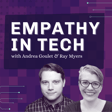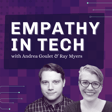
Empathy for Tech Innovation with Christian Idiodi
Christian Idiodi is a leader in the product industry and a Partner at Silicon Valley Product Group. For over 15 years, he has developed teams that build innovative, disruptive, and market-transforming technology products. He has worked with organizations such as CareerBuilder, Merrill Corporation, Microsoft, Starbucks, and Squarespace and teaches product management and innovation at Virginia Commonwealth University.
Christian is passionate about creating practical tech solutions for Africa's social and economic issues, such as unemployment, poverty, healthcare, insecurity, and financial exclusion. He has founded several companies in Africa and is the Chairman of Innovate Africa Foundation, a non-profit organization that enables tech innovation for social good in Africa. Through these initiatives, he aims to empower and inspire the next generation of African tech leaders and entrepreneurs.
Sponsored by CodeCrafters - discount link
LINKS
- Product Therapy Podcast
- Christian’s LinkedIn
- How To Win Friends and Influence People by Dale Carnegie
- Innovate Africa Foundation
- Silicon Valley Product Group
HOSTS
- Andrea Goulet LinkedIn | andreagoulet.com
- Ray Myers LinkedIn | Craft vs Cruft on YouTube
ABOUT EMPATHY IN TECH
Empathy in Tech is on a mission to accelerate the responsible adoption of empathy in the tech industry by:
- Closing the empathy skills gap by treating empathy as a technical skill.
- Teaching technical empathy through accessible, affordable, actionable training.
- Building community and breaking down harmful stereotypes and tropes.
- Promoting technical empathy for ethics, equity, and social justice.
Learn more at empathyintech.com

